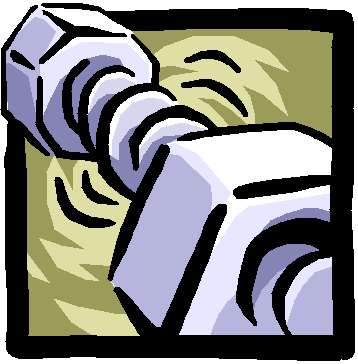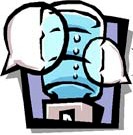|
Kathy's view:
The
"nuts and bolts" question becomes, for me, how can we sustain such a course
within the curriculum, with sufficient enrollment and with ordinary faculty load
values (a question perhaps revealing my recent change from my faculty position
to an administrative position). The course as taught enrolled small
numbers of highly motivated students, involved the dedicated service of an
exceptional instructor (Cora Agatucci), who received something above normal load
to support the experiment, and drew heavily on the services of the sole
Technology Coordinator (Barbara Klett, bless her soul!) at our college. Were the course to be an ongoing
and self-sustaining part of our curriculum, it seems to me the following three
options are worth considering (and perhaps all three should be adopted)--each
option presenting advantages, but (unfortunately) also
disadvantages.
It would be very helpful
to get advice from participants who have experience with such
questions at other institutions.
1. Create a writing course introducing web-writing and focused on "cyber rhetoric."
The HUM 299 course had no prerequisites, and in one
quarter provided instruction to enable students to create web pages even if they
had very little technology literacy. An introductory web-writing course,
perhaps equivalent to the research paper course which usually completes the
3-course required English Composition sequence for the Associate of Arts degree
at our college, would be one way of keeping wide
access to a range of students. The
focus of instruction and of student effort could be narrowed if students were
given the option of working with web templates.
Advantages:
The writing demands of the web are clearly specific enough to require direct
instruction, instruction at a rhetorical level not obviously part of web design
and web production classes taught within Computer Science departments.
The web template flattens the learning curve for students and also
reduces the distractions of graphic design and expression (though we continue to
debate whether the reduction of these features results in fatal change to the
web writing experience). Clearly,
becoming web authors enables students to achieve a visceral appreciation of the
intellectual property rights so easily ignored on the web, and clearly most
students are doing most of their research paper searching on the web, so the
overlay in outcomes between this course and the English Composition research
paper courses are sufficiently close.
Disadvantages:
The focus on writing and research may eliminate
too many of the elements that led to the striking student persistence during the
experimental course: the opportunity to create, to express, to soar.
Overall, this alternative does not answer two of the most central of our
original aimsó the aims of harnessing the creative lure of the web and of
connecting our students across disciplines and to other cultures and points of
view.
2. Make
"Student Perspectives on World and Multicultural Writers" a permanent part of the
humanities curriculum fulfilling general education breadth requirements or
electives.
Set appropriate web writing and graphics/visual literacy prerequisites.
The students would come in prepared for the course requirements, thus
making the workload for students and instructor more manageable.
The resources of the web would continue to be harnessed for students
interested in these topics, and the students would continue to express their
unhampered creativity. Setting such
prerequisites is now possible at our college. Our CIS (Computer
Information Systems) Dept. began offering web authoring courses in Fall 2000,
including a course devoted specifically to using FrontPage software.
Indeed, a big consumer of Hum 299 course time was teaching students the
operational basics of WWW writing using FrontPage software and giving them
opportunity to conduct first-flush experimentation (however exciting).
Advantages:
Our project has demonstrated that student web writing can be a powerful
tool in multicultural education. This option keeps that focus at the
forefront.
Disadvantages:
Assuming we can fund the course, as an elective, breadth
option, we have
concluded there are no disadvantages. Our students' work has proven the
value of such a course.
3. The 3rd
option is to go beyond the curriculum, to the creation of a virtual
web space that would foster and host a number
of different multicultural/international student projects.
This web space could support a number of courses across the
curriculum (anthropology, foreign language, geography, history,
literature, to name a few) that address multicultural/international
issues from many disciplinary perspectives.
Advantages:
Such a Multicultural/International Studies web space would support a number of our original objectives: allowing
students to work together or individually to produce and publish work in almost
any of their courses, should they choose a web project option; opening up to
student creativity; involving the kind of faculty oversight necessary to ensure
good web authoring and web citation practices. Most importantly, this option
supports our aim of increasing opportunities for students to work across the
disciplines. And this option
supports some important new curricular directions: for example, lower and upper
division applied communications programs now in the drafting stage.
Disadvantages:
The
web space would require both virtual and actual support.
The cost of launching and maintaining such a web space is likely to be
prohibitive, given that close faculty and staff involvement would be necessary to
maintain desirable pedagogical and quality standards.
Staff
support would include tech support, tutoring assistance, and faculty load (for a
guiding faculty member and for involvement, when needed, of faculty across the
disciplines). Technical requirements would include significant web server space (currently
not provided to students), wider availability of web authoring software, and
increased access to computer labs.
|

![]()
